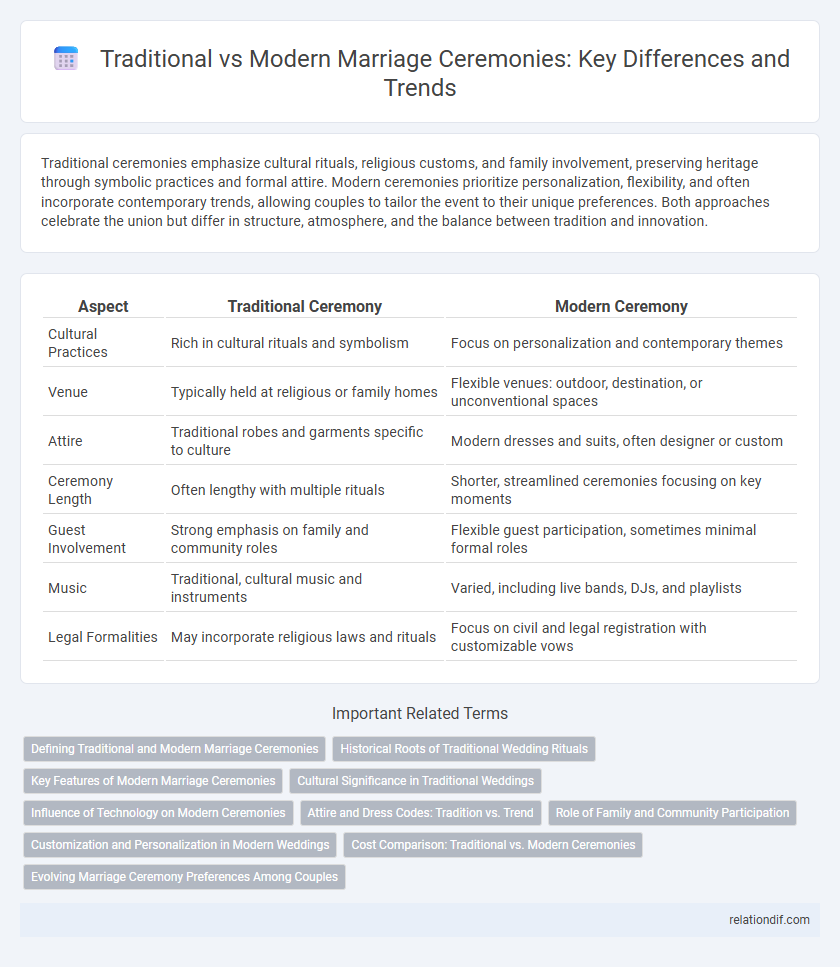Traditional ceremonies emphasize cultural rituals, religious customs, and family involvement, preserving heritage through symbolic practices and formal attire. Modern ceremonies prioritize personalization, flexibility, and often incorporate contemporary trends, allowing couples to tailor the event to their unique preferences. Both approaches celebrate the union but differ in structure, atmosphere, and the balance between tradition and innovation.
Table of Comparison
| Aspect | Traditional Ceremony | Modern Ceremony |
|---|---|---|
| Cultural Practices | Rich in cultural rituals and symbolism | Focus on personalization and contemporary themes |
| Venue | Typically held at religious or family homes | Flexible venues: outdoor, destination, or unconventional spaces |
| Attire | Traditional robes and garments specific to culture | Modern dresses and suits, often designer or custom |
| Ceremony Length | Often lengthy with multiple rituals | Shorter, streamlined ceremonies focusing on key moments |
| Guest Involvement | Strong emphasis on family and community roles | Flexible guest participation, sometimes minimal formal roles |
| Music | Traditional, cultural music and instruments | Varied, including live bands, DJs, and playlists |
| Legal Formalities | May incorporate religious laws and rituals | Focus on civil and legal registration with customizable vows |
Defining Traditional and Modern Marriage Ceremonies
Traditional marriage ceremonies are deeply rooted in cultural and religious rituals, often emphasizing family involvement, symbolic customs, and time-honored practices that reflect the heritage of the couple. Modern marriage ceremonies prioritize personalization, flexibility, and often incorporate contemporary elements such as non-religious vows, diverse venues, and unique themes tailored to the couple's preferences. Defining these ceremonies involves contrasting the preservation of ancestral rites in traditional weddings with the adaptive, individualistic approach that characterizes modern celebrations.
Historical Roots of Traditional Wedding Rituals
Traditional wedding rituals have deep historical roots that reflect cultural heritage, symbolizing unity through time-honored customs such as exchanging rings and ceremonial blessings. These rituals often originated from religious practices and societal norms dating back centuries, reinforcing family bonds and community values. Modern ceremonies may incorporate contemporary elements but frequently draw inspiration from these enduring traditional practices to maintain a sense of continuity and meaning.
Key Features of Modern Marriage Ceremonies
Modern marriage ceremonies emphasize personalization, incorporating unique themes and interactive elements to reflect the couple's individual personalities. Technology plays a significant role, with live streaming options, digital invitations, and multimedia presentations enhancing guest engagement. Sustainability and inclusivity are often prioritized, with eco-friendly practices and diverse cultural traditions integrated seamlessly into the celebration.
Cultural Significance in Traditional Weddings
Traditional wedding ceremonies hold profound cultural significance by preserving ancestral customs and rituals that reflect a community's identity and values. These ceremonies often include symbolic acts, such as specific attire, music, and religious rites, which represent the continuity of cultural heritage and social bonds. Unlike modern weddings that emphasize personalization and contemporary trends, traditional weddings serve as a vital link connecting generations and reinforcing collective memory within a cultural context.
Influence of Technology on Modern Ceremonies
Modern wedding ceremonies increasingly integrate advanced technology such as live streaming, drone videography, and virtual reality experiences to connect distant guests and capture moments with unprecedented clarity and creativity. Digital invitations, automated planning apps, and AI-driven customization enhance convenience and personalization, transforming the traditional wedding planning process. Technology also enables eco-friendly alternatives by reducing paper use and promoting sustainable decoration options, reflecting evolving values in contemporary marriage celebrations.
Attire and Dress Codes: Tradition vs. Trend
Traditional marriage ceremonies often feature attire rooted in cultural heritage, such as intricate embroidery, specific colors, and symbolic accessories reflecting regional or religious significance. Modern ceremonies tend to embrace contemporary fashion trends, with brides and grooms opting for sleek, minimalist designs, unconventional colors, and personalized dress codes that prioritize comfort and individuality. The contrast between traditional and modern dress codes highlights evolving social norms while preserving cultural identity through clothing.
Role of Family and Community Participation
Traditional marriage ceremonies emphasize active family involvement and community participation, reinforcing cultural values and collective support through rituals and shared responsibilities. Modern ceremonies often prioritize the couple's preferences, sometimes reducing extensive family roles but still encouraging community presence to celebrate the union. Balancing tradition and modernity, many weddings integrate family input with personalized elements, fostering inclusive celebration and meaningful connections.
Customization and Personalization in Modern Weddings
Modern weddings emphasize customization and personalization, allowing couples to tailor every aspect of their ceremony to reflect their unique personalities and preferences. Unlike traditional ceremonies that follow established rituals and cultural norms, modern ceremonies incorporate personalized vows, customized decor, and innovative themes that resonate with the couple's story. This shift toward individualized celebrations enhances emotional significance and creates memorable, one-of-a-kind experiences for both the couple and their guests.
Cost Comparison: Traditional vs. Modern Ceremonies
Traditional marriage ceremonies often incur higher costs due to extensive cultural rituals, elaborate attire, and large guest lists, averaging between $30,000 to $50,000 depending on region and customs. Modern ceremonies tend to have more flexible budgets, with average expenses around $20,000 to $35,000, benefiting from streamlined events and personalized, less formal settings. Cost factors for both include venue, catering, attire, and entertainment, but traditional ceremonies typically require additional expenditures for ceremonial items and numerous cultural-specific customs.
Evolving Marriage Ceremony Preferences Among Couples
Couples increasingly favor modern ceremonies that emphasize personalization and contemporary themes over traditional rites bound by cultural conventions. Evolving marriage ceremony preferences reveal a shift toward intimate gatherings, creative venues, and symbolic rituals that reflect individual values instead of formal protocols. Data shows a growing trend where couples integrate technology, eco-friendly practices, and diverse cultural elements into their nuptials to express their unique identities.
Traditional Ceremony vs Modern Ceremony Infographic

 relationdif.com
relationdif.com